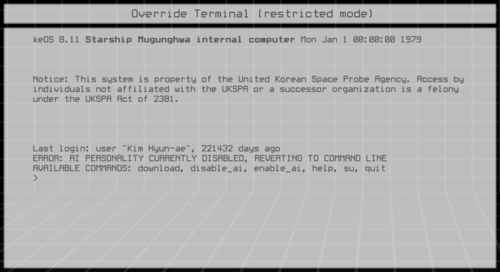
“Why won’t this stupid thing let me tab-complete commands, dammit? It’s not seriously expecting me to type them all out, is it?”
One of the things I enjoy about Christine Love’s visual novels is that they expand the interface beyond the usual “click through pages of text and occasionally make a choice” paradigm. The command line above, for instance, is the way you first interact with a new game of Analogue, while the main story itself is explored (with the assistance of some AI helpers) through a graphical document browser that can be launched from the initial text-mode shell. Even if what you’re doing is in some sense essentially the same as with a regular VN – reading long stretches of words on a screen – it feels like you’re making some effort to discover the story on your own, rather than having it just presented to you.
The layering of two different interfaces does an interesting job of both distancing you from and bringing you further into the game’s plot. On the one hand, the presence of another environment external to the main archive reinforces your position as an outsider looking in on the characters’ past; appropriate, as you play the role of someone sent in to merely salvage the documents, not read them. On the other, though, it also makes the game seem more real – this is how you’d actually be interacting with the story if you were in the player character’s shoes, remotely interfacing with the computers of a starship floating dead in space. Analogue even explains why you can only give the AIs information in the form of binary choices. It’s all impressively thought out.
I’m also a fan of the soundtrack, which plays a big role in setting the atmosphere: isolated, minimalistic, but not devoid of humanity.
Analogue is, as with Love’s other visual novels, fairly short; out of the five available endings, I’ve already finished one, and that in just two and a half hours to boot. I’ll probably come back here later with more detailed thoughts on the story proper once I’ve tackled the other four. My initial impressions, though, are already very positive.